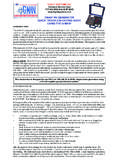Transcription of Syllabus for T.Y.B.Sc. Programme: B.Sc.
1 Academic Council 14/06/2018 Item No: UNIVERSITY OF MUMBAI Syllabus for Programme: Subject: Information Technology with effect from the academic year 2018 2019 2 3 Semester 5 Course Code Course Type Course Title Credits USIT501 Skill Enhancement Course Software Project Management 2 USIT502 Skill Enhancement Course Internet of Things 2 USIT503 Skill Enhancement Course Advanced Web Programming 2 USIT504 Discipline Specific Elective (Any One) Artificial Intelligence 2 USIT505 Linux System Administration USIT506 Discipline Specific Elective (Any One)
2 Enterprise Java 2 USIT507 Next Generation Technologies USIT5P1 Skill Enhancement Course Practical Project Dissertation 2 USIT5P2 Skill Enhancement Course Practical Internet of Things Practical 2 USIT5P3 Skill Enhancement Course Practical Advanced Web Programming Practical 2 USIT5P4 Discipline Specific Elective Practical (Any One)* Artificial Intelligence Practical 2 USIT5P5 Linux Administration Practical USIT5P6 Discipline Specific Elective Practical (Any One)* Enterprise Java Practical 2 USIT5P7 Next Generation Technologies Practical Total Credits 20 (All the practical mentioned in the syllabi are compulsory as per the courses chosen) Semester 6 Course Code Course Type Course Title Credits USIT601 Skill Enhancement Course Software Quality Assurance 2 USIT602 Skill Enhancement Course Security in Computing 2 USIT603 Skill Enhancement Course Business Intelligence 2 USIT604 Discipline Specific Elective (Any One)
3 Principles of Geographic Information Systems 2 USIT605 Enterprise Networking USIT606 Discipline Specific Elective (Any One) IT Service Management 2 USIT607 Cyber Laws USIT6P1 Skill Enhancement Course Practical Project Implementation 2 USIT6P2 Skill Enhancement Course Practical Security in Computing Practical 2 USIT6P3 Skill Enhancement Course Practical Business Intelligence Practical 2 USIT6P4 Discipline Specific Elective Practical (Any One)* Principles of Geographic Information Systems Practical 2 USIT6P5 Enterprise Networking Practical USIT6P6 Skill Enhancement Course Practical Advanced Mobile Programming 2 Total Credits 20 *The choice of Practical course is based on the theory Course.
4 For Semester V, USIT504, USIT505, USIT506 and USIT507, the practical courses are USIT5P4, USIT5P5 USIT5P6, USIT5P7. For Semester VI, USIT604, USIT605 the practical courses are USIT6P4, USIT6P5 respectively. Practical Course USIT6P6 is compulsory. 4 SEMESTER V 5 B. Sc. (Information Technology) Semester V Course Name: Software Project Management Course Code: USIT501 Periods per week (1 Period is 50 minutes) 5 Credits 2 Hours Marks Evaluation System Theory Examination 2 75 Internal -- 25 Unit Details Lectures I Introduction to Software Project Management: Introduction, Why is Software Project Management Important?
5 What is a Project? Software Projects versus Other Types of Project, Contract Management and Technical Project Management, Activities Covered by Software Project Management, Plans, Methods and Methodologies, Some Ways of Categorizing Software Projects, Project Charter, Stakeholders, Setting Objectives, The Business Case, Project Success and Failure, What is Management? Management Control, Project Management Life Cycle, Traditional versus Modern Project Management Practices. Project Evaluation and Programme Management: Introduction, Business Case, Project Portfolio Management, Evaluation of Individual Projects, Cost benefit Evaluation Techniques, Risk Evaluation, Programme Management, Managing the Allocation of Resources within Programmes, Strategic Programme Management, Creating a Programme, Aids to Programme Management, Some Reservations about Programme Management, Benefits Management.
6 An Overview of Project Planning: Introduction to Step Wise Project Planning, Step 0: Select Project, Step 1: Identify Project Scope and Objectives, Step 2: Identify Project Infrastructure, Step 3: Analyse Project Characteristics, Step 4: Identify Project Products and Activities, Step 5: Estimate Effort for Each Activity, Step 6: Identify Activity Risks, Step 7: Allocate Resources, Step 8: Review/Publicize Plan, Steps 9 and 10: Execute Plan/Lower Levels of Planning 12 II Selection of an Appropriate Project Approach: Introduction, Build or Buy?
7 Choosing Methodologies and Technologies, Software Processes and Process Models, Choice of Process Models, Structure versus Speed of Delivery, The Waterfall Model, The Spiral Model, Software Prototyping, Other Ways of Categorizing Prototypes, Incremental Delivery, Atern/Dynamic Systems Development Method, Rapid Application Development, Agile Methods, Extreme Programming (XP), Scrum, Lean Software Development, Managing Iterative Processes, Selecting the Most Appropriate Process Model. Software Effort Estimation: Introduction, Where are the Estimates Done?
8 Problems with Over- and Under-Estimates, The Basis for Software Estimating, Software Effort Estimation Techniques, Bottom-up Estimating, The Top-down Approach and Parametric Models, Expert Judgement, Estimating by Analogy, Albrecht Function Point 12 6 Analysis, Function Points Mark II, COSMIC Full Function Points, COCOMO II: A Parametric Productivity Model, Cost Estimation, Staffing Pattern, Effect of Schedule Compression, Capers Jones Estimating Rules of Thumb. III Activity Planning: Introduction, Objectives of Activity Planning, When to Plan, Project Schedules, Projects and Activities, Sequencing and Scheduling Activities, Network Planning Models, Formulating a Network Model, Adding the Time Dimension, The Forward Pass, Backward Pass, Identifying the Critical Path, Activity Float, Shortening the Project Duration, Identifying Critical Activities, Activity-on-Arrow Networks.
9 Risk Management: Introduction, Risk, Categories of Risk, Risk Management Approaches, A Framework for Dealing with Risk, Risk Identification, Risk Assessment, Risk Planning, Risk Management, Evaluating Risks to the Schedule, Boehm s Top 10 Risks and Counter Measures, Applying the PERT Technique, Monte Carlo Simulation, Critical Chain Concepts. Resource Allocation: Introduction, Nature of Resources, Identifying Resource Requirements, Scheduling Resources, Creating Critical Paths, Counting the Cost, Being Specific, Publishing the Resource Schedule, Cost Schedules, Scheduling Sequence.
10 12 IV Monitoring and Control: Introduction, Creating the Framework, Collecting the Data, Review, Visualizing Progress, Cost Monitoring, Earned Value Analysis, Prioritizing Monitoring, Getting the Project Back to Target, Change Control, Software Configuration Management (SCM). Managing Contracts: Introduction, Types of Contract, Stages in Contract Placement, Typical Terms of a Contract, Contract Management, Acceptance. Managing People in Software Environments: Introduction, Understanding Behaviour, Organizational Behaviour: A Background, Selecting the Right Person for the Job, Instruction in the Best Methods, Motivation, The Oldham Hackman Job Characteristics Model, Stress, Stress Management, Health and Safety, Some Ethical and Professional Concerns.








